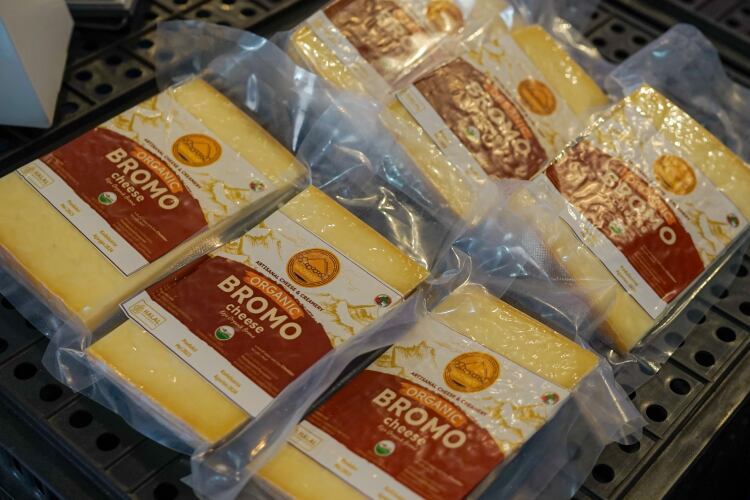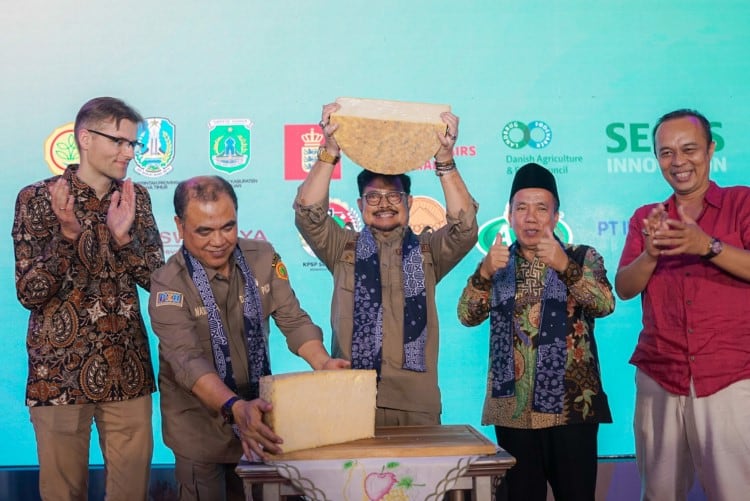Produced by artisanal manufacturer Mazaraat Artisan Cheese, Indonesia’s first organic cheese made locally is a type of hard, yellow cheese, we learned. It will be sold in retail and in food service in Jakarta and Bali shortly, and the first export agreements to Singapore and Malaysia are already in the works.
The project, in which dairy co-operative Arla is lead commercial partner, aimed to support farmers from the Setia Kawan Nongkojajar Dairy Farm Cooperative (KPSP) in East Java in transitioning to organic dairy farming. The project is managed by SEGES Innovation, with The Innovation Centre for Organic Farming providing agricultural expertise from Denmark with support from The Danish Agricultural and Food Council. Alongside Arla and Mazaraat, Indolakto was also a commercial partner, contributing with processing capabilities. NGO Bina Swadaya, the Indonesian organic certification body LeSOS and the Danish Ministry of Foreign Affairs are also also supporting the initiative.
The project kicked off after in 2018 and 2019 a delegation of Indonesian government representatives and KPSP farmers visited Denmark to learn about organic dairy production. A formal partnership was then formed, with the first step in the project involving building capacity and supporting KPSP’s farmers in transitioning from conventional to organic dairy farming.

In 2022, four pilot farms were established to be the first that will undergo the transition; the first organic dairy calves were born in the same year and the cows started to produce certified-organic milk – also an industry-first at the time, according to Arla. The farmers also received training in cow management, barn design, organic feed, use of herbal medicine, and more.
Finally, in 2023, Mazaraat Artisan Cheese launched the first batch of locally-produced organic cheese produced in the country. While the milk volume only amounts to 60 liters per day currently, intake is set to increase to 250 liters per day end of the year and to 6,000 liters per day by 2026, we were told.
As lead commercial partner, Arla Foods is providing processing expertise and route-to-market support.
Indonesia is a net dairy importer
Demand for dairy in Indonesia is set to increase by 6% in 2023 alone, but locally-made dairy is only a small niche, with around 80% of dairy products coming from abroad. Organic is believed to make up just 2% of the market, and the government has launched a campaign to increase organic foods’ market share of from 5-20% of the total food market by 2024.
But why did it take so long for the first locally-made organic dairy cheese to be manufactured? Vytautas Petronis, MD for Arla in Indonesia, highlighted some of the factors behind this. “First of all, it is necessary to identify a clear organic dairy standard in Indonesia that takes the local situation into account. We can’t just copy the standards from other countries and expect that to work.
“Secondly, most Indonesian dairy farmers are smallholder farmers, meaning they are more vulnerable when it comes to the investment needed in the conversion from conventional to organic. The certification process can also be expensive, so we were looking into how we can support that in an Indonesian context.”
Lisbeth Henricksen, Director of Innovation from SEGES Innovation, added: “The Indonesian organic standards have to reflect the local context where many of the farms are located in villages and without fields surrounding the barns but we have outlined the basics of organic milk production in terms of animal welfare, feed and concentrate production. Converting the first smallholder farms in Indonesia, with only 3-5 cows, from conventional to certified organic dairy production represents a significant step forward.”
While Petronis insisted Arla’s involvement in the project wasn’t just business, there are several clear benefits for Europe’s largest dairy co-op. “Being a partner in this project has put us in contact with some exciting and important players within the Indonesian dairy sector. They have shared their knowledge of the local market, just as we have shared our expertise on marketing and production of artisanal cheese and organic dairy,” Petronis stated.
Arla is currently offering organic UHT milk, snacking cheese, whipping cream and cream cheese in Indonesia.
“Indonesia is still a relatively new and small market for Arla Foods, but we are expecting high growth rate in the coming years,” he added. “The local dairy demand is expected to grow 6-7% annually and there is an increasing interest for consumer health where high quality, and especially organic, comes in.
“As the world’s largest organic dairy producer, we have a wide range of products that could be interesting for the Indonesian market in both retail and food service.”

